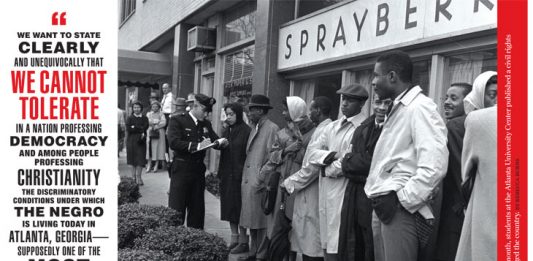John F. Kennedy
By Brianna Lee
John F. Kennedy was the 35th President of the United States. While Kennedy’s involvement with the Atlanta student movement was minor, the influence it had on both the movement and Kennedy as a candidate were massive. Civil rights, including racial integration in schools and businesses, were a large part of Kennedy’s platform as he ran for president against Richard Nixon in 1960.

When Martin Luther King Jr. was jailed following his participation in the Atlanta sit-ins Kennedy phoned Dr. King’s wife, Coretta Scott King, to show his support of the demonstrators at Rich’s.
Later, Kennedy’s brother, Robert, called Georgia governor Ernest Vandiver and convinced him to release Dr. King from prison.
John F. Kennedy
When Martin Luther King Jr. was jailed following his participation in the Atlanta sit-ins Kennedy phoned Dr. King’s wife, Coretta Scott King, to show his support of the demonstrators at Rich’s.
Later, Kennedy’s brother, Robert, called Georgia governor Ernest Vandiver and convinced him to release Dr. King from prison.
The move helped to influence Dr. King’s father, who began to implore his congregation at Ebenezer Baptist Church to vote for Kennedy.
Kennedy would go on to win the 1960 election with help from Georgia’s 12 electoral college votes and accelerate race relations in America. The 1960 election also marked the beginning of the Democratic party being the party associated with civil rights thanks to Kennedy’s successful election, due in part to his involvement in the Atlanta Student Movement.
Source for phone call with Coretta Scott King: The Atlanta Student Movement: A Look
Back
At breakfast tables across Atlanta on March 9, 1960, quiet consumption of coffee,
grits, and eggs was disrupted as subscribers to the Atlanta Constitution and Atlanta
Daily World opened their morning papers to discover a startling full-page ad.
Source for everything else:
https://en.wikipedia.org/wiki/John_F._Kennedy#Civil_rights/






